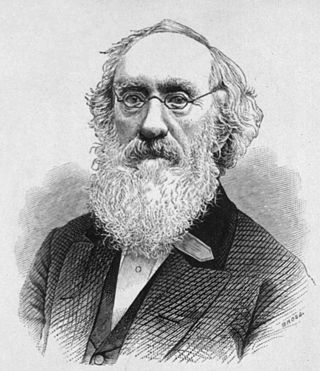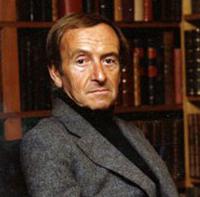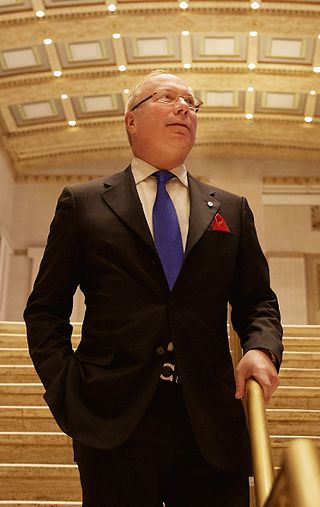Related Research Articles
The Quiet Revolution was a period of intense socio-political and socio-cultural change in French Canada which started in Quebec after the election of 1960, characterized by the effective secularization of government, the creation of a state-run welfare state (état-providence), as well as realignment of politics into federalist and sovereigntist factions and the eventual election of a pro-sovereignty provincial government in the 1976 election. The Quiet Revolution typically refers to the efforts made by the Liberal government of Jean Lesage and sometimes Robert Bourassa, though given the profound effect of the changes, most provincial governments since the early 1960s have maintained an orientation based on core concepts developed and implemented in that era.
David Jay Bercuson is a Canadian labour, military, and political historian.

Colonel George Francis Gillman Stanley was a Canadian historian, author, soldier, teacher, public servant, and designer of the Canadian Flag.

Edmund Bailey O'Callaghan, was an Irish doctor, historian and journalist.

Brian Moore, was a novelist and screenwriter from Northern Ireland who emigrated to Canada and later lived in the United States. He was acclaimed for the descriptions in his novels of life in Northern Ireland during and after the Second World War, in particular his explorations of the inter-communal divisions of The Troubles, and has been described as "one of the few genuine masters of the contemporary novel". He was awarded the James Tait Black Memorial Prize in 1975 and the inaugural Sunday Express Book of the Year award in 1987, and he was shortlisted for the Booker Prize three times. Moore also wrote screenplays and several of his books were made into films.

Irish Canadians are Canadian citizens who have full or partial Irish heritage including descendants who trace their ancestry to immigrants who originated in Ireland. 1.2 million Irish immigrants arrived from 1825 to 1970, and at least half of those in the period from 1831 to 1850. By 1867, they were the second largest ethnic group, and comprised 24% of Canada's population. The 1931 national census counted 1,230,000 Canadians of Irish descent, half of whom lived in Ontario. About one-third were Catholic in 1931 and two-thirds Protestant.
Dr. Afua Ava Pamela Cooper is a Jamaican-born Canadian historian. As a historian, "she has taught Caribbean cultural studies, history, women's studies and Black studies at Ryerson and York universities, at the University of Toronto and at Dalhousie University." She is also an author and dub poet who as of 2018, has published five volumes of poetry.
George Norman Hillmer is a Canadian historian and is among the leading scholars on Canada–US relations.
The McGill–Queen's University Press (MQUP) is a Canadian university press formed as a joint venture between McGill University in Montreal, Quebec and Queen's University at Kingston in Kingston, Ontario.

This is a bibliography of major works on the History of Canada.

Adam Shortt (1859–1931) was an economic historian in Ontario. He was the first full-time employed academic in the field at a Canadian university.
Patrick James, is Professor of International Relations at the University of Southern California in Los Angeles, CA, and Director of the USC Center for International Studies.
Peter Busby Waite was a Canadian historian and Dalhousie University professor.
The Irish language originated in Ireland and has historically been the dominant language of the Irish people. They took it with them to a number of other countries, and in Scotland and the Isle of Man it gave rise to Scottish Gaelic and Manx, respectively.
This is a bibliography of notable works on New Brunswick, Canada.
Fen Osler Hampson is Chancellor's Professor at Carleton University and President of the World Refugee & Migration Council. He was a Distinguished Fellow and Director of Global Security Research at The Centre for International Governance Innovation. He is Co-Director of the Global Commission on Internet Governance. He was elected a Fellow of the Royal Society of Canada.

Laurence B. Mussio is a Canadian business historian, author, professor, management consultant and special advisor to senior executives, best known for his publications in finance, communications, political economy and reputation management.
Graeme Morton is a Scottish academic historian who has occupied the Chair of Modern History at the University of Dundee since 2013.
Martha Langford is a Canadian art historian. She is a Distinguished University Research Professor of art history at Concordia University and the Research Chair and Director of the Gail and Stephen A. Jarislowsky Institute for Studies in Canadian Art. She was the founding director of the Canadian Museum of Contemporary Photography and served as its director and chief curator from 1985 until 1994. She is an elected Fellow of the Royal Society of Canada.
Rosa del Carmen Bruno-Jofré (1946) is a historian. She is a professor and former Dean of Education at Queen's University. In 2019, Bruno-Jofré was elected a Fellow of the Royal Society of Canada.
References
- 1 2 3 4 5 6 7 8 9 Akenson, Donald (2017). "Akenson Queen's University" (PDF). Queen's University.
- ↑ "Queen's names first Distinguished University Professors". Queen's Gazette - Queen's University. May 13, 2019. Retrieved May 16, 2019.
- ↑ "John V. Kelleher Creative force for establishment of Irish studies in US universities". The Irish Times. Retrieved September 5, 2017.
- ↑ J., Brose, Olive (April 1, 1973). "Donald Harman Akenson. <italic>The Church of Ireland: Ecclesiastical Reform and Revolution, 1800–1885</italic>. New Haven: Yale University Press. 1971. Pp. xiii, 413. $15.00". The American Historical Review. 78 (2). doi:10.1086/ahr/78.2.452. ISSN 0002-8762.
- ↑ TITLEY, BRIAN (1979). "The Historiography of Irish Education: A Review Essay". The Journal of Educational Thought. 13 (1): 66–77. JSTOR 23768464.
- ↑ Akenson, Donald H. (July 1, 2012). Ireland, Sweden and the Great European Migration: 1815-1914. by Donald Harman Akenson. Liverpool: Liverpool University Press. ISBN 9781846317507.
- ↑ Dennis, Clark (February 1, 1986). "<sc>donald harman akenson</sc>. <italic>Being Had: Historians, Evidence, and the Irish in North America</italic>. Port Credit, Ont.: P. D. Meany. 1985. Pp. 243. $45.00". The American Historical Review. 91 (1). doi:10.1086/ahr/91.1.195. ISSN 0002-8762.
- ↑ Gribben, Arthur (1999). The Great Famine and the Irish Diaspora in America . Univ of Massachusetts Press. p. 19. ISBN 978-1558491731.
akenson.
- ↑ "The Irish Diaspora". History Ireland. January 25, 2013. Retrieved September 6, 2017.
- ↑ "Ireland, Sweden and the Great European Migration - Liverpool University Press". Liverpool University Press. Retrieved September 5, 2017.
- ↑ "Browse Books | McGill-Queen's University Press". www.mqup.ca. Retrieved September 5, 2017.